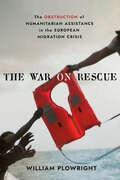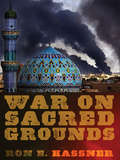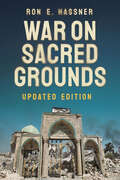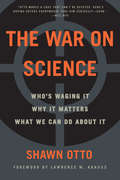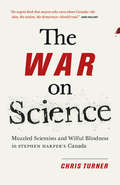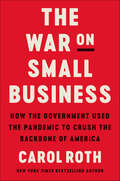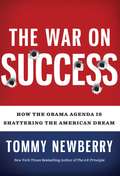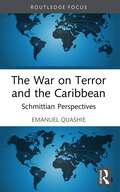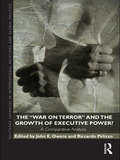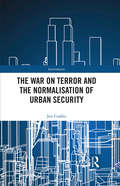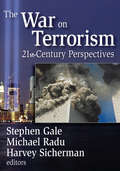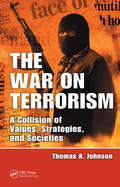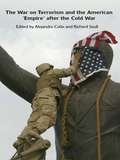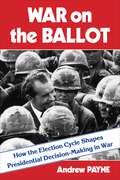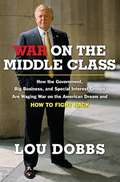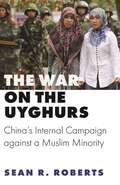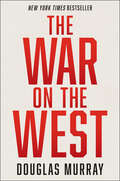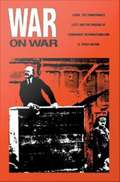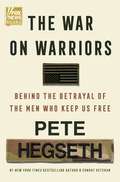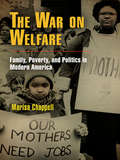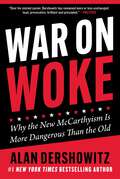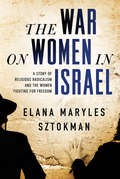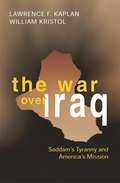- Table View
- List View
The War on Rescue: The Obstruction of Humanitarian Assistance in the European Migration Crisis
by William PlowrightThe War on Rescue documents how governments block assistance to people in times of crisis. Focusing on the European Migration Crisis of 2015–2022 to address the reasons why governments do this, William Plowright discusses the strategies employed that prevent suffering people from receiving help. The European Migration Crisis motivated people around the world to offer assistance to needy refugees and migrants across Europe, the Mediterranean, and North Africa. Both large and small organizations rushed to bring food, medical care, and rescue to those stranded at sea. However, many European governments sought to prevent humanitarian assistance and deny safe haven to the desperate. Boats filled with those rescued were blocked from harbors, activists were arrested, and staff were threatened; some faced violence. The War on Rescue adds to social science understanding of and explanations for humanitarian assistance and the reasons why governments obstruct rescue efforts.
War on Sacred Grounds
by Ron E. HassnerSacred sites offer believers the possibility of communing with the divine and achieving deeper insight into their faith. Yet their spiritual and cultural importance can lead to competition as religious groups seek to exclude rivals from practicing potentially sacrilegious rituals in the hallowed space and wish to assert their own claims. Holy places thus create the potential for military, theological, or political clashes, not only between competing religious groups but also between religious groups and secular actors. In War on Sacred Grounds, Ron E. Hassner investigates the causes and properties of conflicts over sites that are both venerated and contested; he also proposes potential means for managing these disputes. Hassner illustrates a complex and poorly understood political dilemma with accounts of the failures to reach settlement at Temple Mount/Haram el-Sharif, leading to the clashes of 2000, and the competing claims of Hindus and Muslims at Ayodhya, which resulted in the destruction of the mosque there in 1992. He also addresses more successful compromises in Jerusalem in 1967 and Mecca in 1979. Sacred sites, he contends, are particularly prone to conflict because they provide valuable resources for both religious and political actors yet cannot be divided. The management of conflicts over sacred sites requires cooperation, Hassner suggests, between political leaders interested in promoting conflict resolution and religious leaders who can shape the meaning and value that sacred places hold for believers. Because a reconfiguration of sacred space requires a confluence of political will, religious authority, and a window of opportunity, it is relatively rare. Drawing on the study of religion and the study of politics in equal measure, Hassner's account offers insight into the often-violent dynamics that come into play at the places where religion and politics collide.
War on Sacred Grounds (Religion and Conflict)
by Ron E. HassnerIn War on Sacred Grounds, Ron E. Hassner investigates the causes and properties of struggles over sites that are both venerated and contested, and proposes ways for managing these disputes. Holy places can create the potential for clashes, not only between competing religious groups but also between religious groups and secular actors. Hassner illustrates this complex, violent dynamic through a series of case studies, including the conflict over Jerusalem and competing Hindu and Muslim claims over Ayodhya. He also analyses successful compromises that reduced conflict in Jerusalem in 1967 and in Mecca in 1979. In this updated edition of War on Sacred Grounds, Hassner reevaluates his findings and conclusions and surveys ongoing conflicts over holy sites.
The War on Science: Who's Waging It, Why It Matters, What We Can Do About It
by Shawn Lawrence Otto"Wherever the people are well informed," Thomas Jefferson wrote, "they can be trusted with their own government." But what happens when they are not? In every issue of modern society--from climate change to vaccinations, transportation to technology, health care to defense--we are in the midst of an unprecedented expansion of scientific progress and a simultaneous expansion of danger. At the very time we need them most, scientists and the idea of objective knowledge are being bombarded by a vast, well-funded, three-part war on science: the identity politics war on science, the ideological war on science, and the industrial war on science. The result is an unprecedented erosion of thought in Western democracies as voters, policymakers, and justices actively ignore the evidence from science, leaving major policy decisions to be based more on the demands of the most strident voices.Shawn Otto's compelling new book investigates the historical, social, philosophical, political, and emotional reasons why evidence-based politics are in decline and authoritarian politics are once again on the rise on both left and right, and provides some compelling solutions to bring us to our collective senses, before it's too late.
The War on Science
by Chris TurnerA passionate and meticulously researched argument against the Harper government's war on scienceIn this arresting and passionately argued indictment, award-winning journalist Chris Turner contends that Stephen Harper's attack on basic science, science communication, environmental regulations, and the environmental NGO community is the most vicious assault ever waged by a Canadian government on the fundamental principles of the Enlightenment. From the closure of Arctic research stations as oil drilling begins in the High Arctic to slashed research budgets in agriculture, dramatic changes to the nation's fisheries policy, and the muzzling of government scientists, Harper's government has effectively dismantled Canada's long-standing scientific tradition. Drawing on interviews with scientists whose work has been halted by budget cuts and their colleagues in an NGO community increasingly treated as an enemy of the state, The War on Science paints a vivid and damning portrait of a government that has abandoned environmental stewardship and severed a nation.
The War on Small Business: How the Government Used the Pandemic to Crush the Backbone of America
by Carol RothFor years, government bureaucrats have been looking for ways to destroy small businesses. With coronavirus, they finally had their chance. In 2020, the American economy suffered the biggest financial collapse in history. But while Main Street suffered like never before, the stock market continued to reach new highs. How could this be?The answer is that government had slapped oppressive restrictions on small businesses while propping up Wall Street and engineering a historic consolidation of power and wealth.This isn’t a new problem. During the last financial crisis, Washington bailed out large banks, saying they were “too big to fail.” When the federal government finally pushed out the CARES Act in 2020, it clearly favored the wealthy and well-connected, showing that small businesses were too small to matter. People across the political spectrum constantly complain about the tyranny of big business, and they’re not wrong. However, too many think government is the solution. In reality, government is the problem.In The War on Small Business, entrepreneur Carol Roth unveils the many abuses of power inflicted on small businesses during the COVID-19 pandemic. Small business owners were thrown in jail for trying to make a living. Individual rights were discarded. Big government did what it does best—intentionally protect the rich and powerful. This is the most underreported story coming out of the pandemic. The government chose winners and losers, who would thrive and who would fight to survive, based on not data or science, but based on clout and connections. This enabled the government, with the aid of the Federal Reserve, to oversee the largest wealth transfer in history from Main Street to Wall Street. The issues started long ago and continue today with a highly tilted playing field that favors those “in the club” to the detriment of the average Americans.This book is about the Davids vs. the Goliaths and the decentralization that can help the small, independent businesses and individuals participate in wealth creation. If Americans don’t wake up and stop it, politicians will continue to produce policies that intensify their war on small business and individuals and all that stands in the way of centralized power and control.
The War On Success: How the Obama Agenda Is Shattering the American Dream
by Tommy NewberryIn The War On Success, bestselling author and business success coach Tommy Newberry charges that President Obama and his administration have declared war on the American Dream. A successful entrepreneur and small business owner, Newberry warns that Obama's socialist agenda and big-government programs of dependency threaten both the entrepreneurial spirit of the United States and the well-being of every American family. Through a letter to the president, "politically incorrect" stories from successful businessmen, as well as intensive research and his own personal insight, Newberry reveals how Americans can re-discover the fundamental principles of success and offers readers a concrete action plan and specific steps to take control of their own destiny-and the well-being of their community.
The War on Terror and the Caribbean: Schmittian Perspectives
by Emanuel QuashieThis book offers a multifaceted understanding of how the 9/11 attacks and the subsequent War on Terror affected the Caribbean.This book dives deeper into how the 9/11 attacks and the subsequent War on Terror impacted the region’s tourism industry, anti-terrorism legislation, and the banking/financial and immigration system. This book analyzes the US-led War on Terror through a broader conceptual lens, i.e., using two Schmittian perspectives (the friend–enemy and the sovereign in times of exception), which offers an opportunity for the methodological interpretation of Bush’s counterterrorism policy to give a novel conceptual understanding of the War on Terror in relation to the Caribbean. Thus, this book offers a nuanced and novel perspective on the subject matter.This book will be of much interest to students studying about terrorism, Caribbean studies, political theory, and international relations.
The War on Terror and the Growth of Executive Power?: A Comparative Analysis (Routledge Advances in International Relations and Global Politics)
by John E. OwensThe 9/11 attacks on New York and Washington prompted a "global war on terror" that led to a significant shift in the balance of executive-legislative power in the United States towards the executive at the expense of the Congress. In this volume, seasoned scholars examine the extent to which terrorist threats and counter-terrorism policies led uniformly to the growth of executive or Government power at the expense of legislatures and parliaments in other political systems, including those of Australia, Britain, Canada, Indonesia, Israel, Italy, and Russia. The contributors question whether the "crises" created by 9/11 and subsequent attacks, led inexorably to executive strengthening at the expense of legislatures and parliaments. The research reported finds that democratic forces served to mitigate changes to the balance of legislative and executive power to varying degrees in different political systems. This book will be of interest to students and researchers of Comparative Government Politics and International Politics.
The War on Terror and the Normalisation of Urban Security (Interventions)
by Jon CoaffeeThis book explores the processes by which, in the 20 years after 9/11, the practices of urban security and counter-terrorism have impacted the everyday experiences of the Western city. Highlighting the localised urban responses to new security challenges, it reflects critically upon the historical trajectory of techniques of territorialisation and physical protection, urban surveillance and the increasing need for cities to enhance resilience and prepare for anticipated future attacks and unpacks the practices and impacts of the intensification of recent urban security practices in the name of countering terrorism. Drawing on over 25 years of research and practical experience, the author utilises a range of international case studies, framed by conceptual ideas drawn from critical security, political and geographical theory. The book will be of interest to students and scholars of politics, war studies, urban studies, geography, sociology, criminology, and the growing market of security and resilience professionals, as well as non-academic audiences seeking to understand responses to terrorist risk.
The War on Terrorism: 21st-century Perspectives
by Stephen GaleOn September 11, 2001, a small number of desperate men hoping to earn paradise attacked New York and Washington, D.C. Their spectacular acts of destruction concluded America's nearly decade-long vacation from insecurity, known as the "post-Cold War era." As eras go, this one was short and it certainly ended with a bang, not a whimper. The United States, still sole superpower, was now challenged by a bleak new world. Americans do not care for the bleak and do not tolerate it for long. Predictably, national shock soon became righteous anger, coupled to international campaigns against groups and states held responsible for the scourge of terrorism. These were short-term measures that hurt our enemies but did not "fix" the problem.Not long after these events, the Foreign Policy Research Institute organized a new Center on Terrorism, Counterterrorism, and Homeland Security. Its purpose was to take a longer term view of the terrorism problem and what might be done about it--not only academic research but also policy suggestions. This book contains a broad selection of the Center's output, including essays on American strategy, homeland security, knowing the enemy, and the military dimension. A notable feature is the discussion of the educational issue: what and how to teach our children about terrorism.
The War on Terrorism: A Collision of Values, Strategies, and Societies
by Thomas A. JohnsonIn order to eradicate terrorism, our nation must go beyond merely shoring up military strength. It must also effectively confront the fundamentalist ideology that fuels and supports the terrorists. The War on Terrorism: A Collision of Values, Strategies, and Societies operates on the premise that the violent rejection of globalization at the root o
The War on Terrorism and the American 'Empire' after the Cold War
by Alejandro Colas Richard SaullThis new study shows how the American-led ‘war on terror’ has brought about the most significant shift in the contours of the international system since the end of the Cold War. A new ‘imperial moment’ is now discernible in US foreign policy in the wake of the neo-conservative rise to power in the USA, marked by the development of a fresh strategic doctrine based on the legitimacy of preventative military strikes on hostile forces across any part of the globe. Key features of this new volume include: * an alternative, critical take on contemporary US foreign policy * a timely, accessible overview of critical thinking on US foreign policy, imperialism and war on terror * the full spectrum of critical view sin a single volume * many of these essays are now ‘contemporary classics’ The essays collected in this volume analyse the historical, socio-economic and political dimensions of the current international conjuncture, and assess the degree to which the war on terror has transformed the nature and projection of US global power. Drawing on a range of critical social theories, this collection seeks to ground historically the analysis of global developments since the inception of the new Bush Presidency and weigh up the political consequences of this imperial turn. This book will be of great interest for all students of US foreign policy, contemporary international affairs, international relations and politics.
War on the Ballot: How the Election Cycle Shapes Presidential Decision-Making in War
by Andrew PayneThe president of the United States is at once holder of the highest elected office and commander in chief of the armed forces. How do upcoming elections influence presidents’ behavior during wartime? How do presidents balance perceptions of the national interest with personal political interests?War on the Ballot examines how electoral politics shaped presidential decisions on military and diplomatic strategy during the wars in Korea, Vietnam, and Iraq. Drawing on a wealth of declassified documents and interviews with senior officials and military officers, Andrew Payne reveals the surprisingly large role played by political considerations during conflicts. He demonstrates how the exigencies of the electoral cycle drove leaders to miss opportunities to limit the human and financial costs of each war, gain strategic advantage, or sue for peace, sometimes making critical decisions with striking disregard for the consequences on the ground. Payne emphasizes the importance of electoral pressures throughout the full course of a conflict, not just around the initial decision to intervene. He shows how electoral constraints operate across different phases of the political calendar, going beyond the period immediately preceding a presidential election.Offering a systematic analysis of the relationship between electoral politics and wartime decision-making, this book raises crucial questions about democratic accountability in foreign policy.
War on the Middle Class
by Lou DobbsHow The Government, big business, and special interest groups are waging war on the American dream, and how to fight back.
War on the Middle Class
by Lou DobbsLou Dobbs's bestselling exposé of the silent assault on the living standards of ordinary Americans Millions of TV viewers have known Lou Dobbs for years as the Walter Cronkite of economics coverage, and now the anchor has become the preeminent champion of the common man and the good of the national interest, who tells uncomfortable truths in a voice that can't be ignored. In this incendiary book, he presents a frontline report on the betrayal of America's middle class by interests that range from rapacious corporations to an out-of-touch political elite. The result is not only lost jobs but also dysfunctional schools and unaffordable health care. But War on the Middle Class also outlines a bold program for change. As essential as it is infuriating, this book furnishes the talking points for the national debate on income and class. .
War on the Middle Class
by Lou DobbsLou Dobbs's bestselling exposé of the silent assault on the living standards of ordinary Americans Millions of TV viewers have known Lou Dobbs for years as the Walter Cronkite of economics coverage, and now the anchor has become the preeminent champion of the common man and the good of the national interest, who tells uncomfortable truths in a voice that can't be ignored. In this incendiary book, he presents a frontline report on the betrayal of America's middle class by interests that range from rapacious corporations to an out-of-touch political elite. The result is not only lost jobs but also dysfunctional schools and unaffordable health care. But War on the Middle Class also outlines a bold program for change. As essential as it is infuriating, this book furnishes the talking points for the national debate on income and class.
The War on the Uyghurs: China's Internal Campaign against a Muslim Minority (Princeton Studies in Muslim Politics #78)
by Sean R. RobertsHow China is using the US-led war on terror to erase the cultural identity of its Muslim minority in the Xinjiang regionWithin weeks of the September 11 attacks on New York and Washington, the Chinese government warned that it faced a serious terrorist threat from its Uyghur ethnic minority, who are largely Muslim. In this explosive book, Sean Roberts reveals how China has been using the US-led global war on terror as international cover for its increasingly brutal suppression of the Uyghurs, and how the war's targeting of an undefined enemy has emboldened states around the globe to persecute ethnic minorities and severely repress domestic opposition in the name of combatting terrorism.Of the eleven million Uyghurs living in China today, more than one million are now being held in so-called reeducation camps, victims of what has become the largest program of mass detention and surveillance in the world. Roberts describes how the Chinese government successfully implicated the Uyghurs in the global terror war—despite a complete lack of evidence—and branded them as a dangerous terrorist threat with links to al-Qaeda. He argues that the reframing of Uyghur domestic dissent as international terrorism provided justification and inspiration for a systematic campaign to erase Uyghur identity, and that a nominal Uyghur militant threat only emerged after more than a decade of Chinese suppression in the name of counterterrorism—which has served to justify further state repression.A gripping and moving account of the humanitarian catastrophe that China does not want you to know about, The War on the Uyghurs draws on Roberts's own in-depth interviews with the Uyghurs, enabling their voices to be heard.
The War on the West
by Douglas MurrayChina has concentration camps now. Why do Westerners claim our sins are unique?It is now in vogue to celebrate non-Western cultures and disparage Western ones. Some of this is a much-needed reckoning, but much of it fatally undermines the very things that created the greatest, most humane civilization in the world.In The War on the West, Douglas Murray shows how many well-meaning people have been fooled by hypocritical and inconsistent anti-West rhetoric. After all, if we must discard the ideas of Kant, Hume, and Mill for their opinions on race, shouldn’t we discard Marx, whose work is peppered with racial slurs and anti-Semitism? Embers of racism remain to be stamped out in America, but what about the raging racist inferno in the Middle East and Asia?It’s not just dishonest scholars who benefit from this intellectual fraud but hostile nations and human rights abusers hoping to distract from their own ongoing villainy. Dictators who slaughter their own people are happy to jump on the “America is a racist country” bandwagon and mimic the language of antiracism and “pro-justice” movements as PR while making authoritarian conquests.If the West is to survive, it must be defended. The War on the West is not only an incisive takedown of foolish anti-Western arguments but also a rigorous new apologetic for civilization itself.
War on War: Lenin, the Zimmerwald Left, and the Origins of Communist Internationalism
by R. Craig NationThe outbreak of World War I precipitated a schism in the international socialist movement that endures today. Heeding calls for “rational defense,” the leading European socialist democratic parties abandoned their vision of peace and internationalism as an integral part of the struggle for social justice and set aside their view of interstate war as the clearest example of the irrational essence of competitive capitalism. Only the Zimmerwald Left, led by Lenin, continued to speak out for internationalism. R. Craig Nation utilizes sources in Dutch, French, German, Italian, Russian, and Swedish to provide the first comprehensive history of the Zimmerwald Left as an international political tendency.
The War on Warriors: Behind the Betrayal of the Men Who Keep Us Free
by Pete HegsethReal men fought for our freedoms. It’s time we fought for theirs. <P><P> Pete Hegseth joined the Army to fight extremists. Then that same Army called him one. The military Pete joined twenty years ago was fiercely focused on lethality, competency, and color blindness. Today our brass are following the rest of our country off the cliff of cultural chaos and weakness. <P><P> Americans with common sense are fighting this on many fronts, but if we can’t save the meritocracy of our military, we’re definitely going to lose everywhere else. <P><P> The War on Warriors uncovers the deep roots of our dysfunction—a society that has forgotten the men who take risks, cut through red tape, and get their hands dirty. The only kind of men prepared to face the dangers that the Left pretends don’t exist. Unlike issues of education or taxes or crime, this problem doesn’t have a zip code solution. We can’t move away from it. We can’t avoid it. We have only one Pentagon. Either we take it back or surrender it altogether. <P><P> Combining his own war experiences, tales of outrage, and an incisive look at how the chain of command got so kinked, this book is the key to saving our warriors—and winning future wars. The War on Warriors must be won by the good guys, because when the shooting really starts, they’re the only ones who can save us. <p> <b>New York Times Bestseller</b>
The War on Welfare
by Marisa ChappellWhy did the War on Poverty give way to the war on welfare? Many in the United States saw the welfare reforms of 1996 as the inevitable result of twelve years of conservative retrenchment in American social policy, but there is evidence that the seeds of this change were sown long before the Reagan Revolution--and not necessarily by the Right.The War on Welfare: Family, Poverty, and Politics in Modern America traces what Bill Clinton famously called "the end of welfare as we know it" to the grassroots of the War on Poverty thirty years earlier. Marshaling a broad variety of sources, historian Marisa Chappell provides a fresh look at the national debate about poverty, welfare, and economic rights from the 1960s through the mid-1990s. In Chappell's telling, we experience the debate over welfare from multiple perspectives, including those of conservatives of several types, liberal antipoverty experts, national liberal organizations, labor, government officials, feminists of various persuasions, and poor women themselves.During the Johnson and Nixon administrations, deindustrialization, stagnating wages, and widening economic inequality pushed growing numbers of wives and mothers into the workforce. Yet labor unions, antipoverty activists, and moderate liberal groups fought to extend the fading promise of the family wage to poor African Americans families through massive federal investment in full employment and income support for male breadwinners. In doing so, however, these organizations condemned programs like Aid to Families with Dependent Children (AFDC) for supposedly discouraging marriage and breaking up families. Ironically their arguments paved the way for increasingly successful right-wing attacks on both "welfare" and the War on Poverty itself.
War on Woke: Why the New McCarthyism Is More Dangerous Than the Old
by Alan DershowitzIn War on Woke: Why the New McCarthyism Is More Dangerous Than the Old, Alan Dershowitz—#1 New York Times bestselling author and one of America&’s most respected legal scholars—warns of the danger to the future of civil liberties and equality in America. Alan Dershowitz has been called &“one of the most prominent and consistent defenders of civil liberties in America&” by Politico and &“the nation&’s most peripatetic civil liberties lawyer and one of its most distinguished defenders of individual rights&” by Newsweek. War on Woke exposes new McCarthyite tendencies and tactics of academia, the media, and the business community, especially high tech, that promote closed-minded intolerance. Dershowitz explains that the new woke McCarthyism challenges the basic tenets of the classic liberal (in the traditional sense) state: Freedom of expression; due process; presumption of innocence, right to counsel, equal application of the law; tolerance and respect for differing viewpoints, and that these bedrock principles are rejected by McCarthyite extremists on both the hard left and the hard right. Analyzing the impact of this new woke McCarthyism through the relentless attempts to &“get&” Trump, the attention on the Bidens, and even its international manifestation relative to anti-Semitism, Israel, and the world, Dershowitz investigates the role of media and asks whether the US Supreme Court can constrain this growing threat as new woke McCarthyism becomes mainstream Americanism—especially as the current generation of students and young professionals become our political, media, business, educational, religious, and &“influencer&” leaders.
The War on Women in Israel
by Elana Maryles SztokmanA stunning look at oppression of Israeli women and its dire implications for women everywhere Across Israel, women are being threatened as a rising Orthodox Jewish faction seeks to suppress them. In this gripping exposé, leading women's activist Elana Sztokman investigates the struggles of Israeli women against increasing religious and political oppression, from segregation on public buses to being barred from public events and erased from newspapers and ads. Interviews and investigative research weave together a cutting-edge look at this alarming reality, while the author proposes solutions for creating a different, more egalitarian vision for religious culture in Israeli society and around the world.
The War Over Iraq: Saddam's Tyranny and America's Mission
by Lawrence F. Kaplan William CristolThe importance of how we act.
